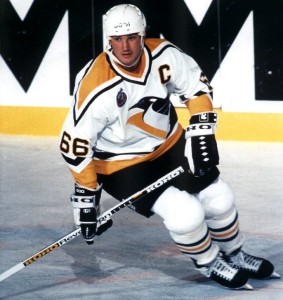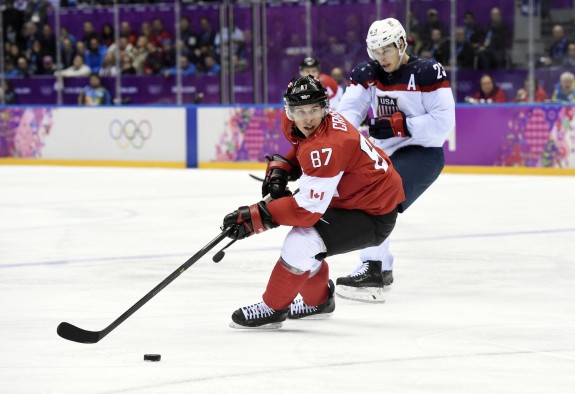A Flyers writer singing the praises of Sidney Crosby? Surely, you must be clamoring to find the schedule for the Hell 2014-15 hockey season, because it’s definitely frozen over at this point.

Not so fast. I am a hockey fan first, and a Philadelphia Flyers fan second. As much as I despise Sidney Crosby and the team he plays for, his abilities must be respected. When I saw a piece claiming the NHL lacked a superstar, I felt it was necessary to properly put Crosby’s accomplishments in an all-time context.
Crosby has everything, and more, to be considered a superstar. The article fails to acknowledge that there is nothing especially exciting about Mike Trout or LeBron James personality wise (Manziel is a completely different story). They are simply tremendous players in sports in which ESPN covers significantly more than hockey (and has broadcast deals with), and are therefore magnified. If Sidney Crosby isn’t a superstar, get ready for the NHL to go a long time without a superstar.
Understanding Sidney Crosby’s Offensive Prowess
I am going to be speaking extensively about a system for comparing players across all eras of hockey called VsX. A detailed description of it can be found here. It is the best way to compare players from different eras with different league and schedule sizes, talent pools, etc. In short, it compares a player’s offensive production to the leading offensive players of a certain year. It shows exactly how much better a player was than his peers, and gives universal results across eras.
To evaluate a player’s career, a 7 year weighted average of their best VsX scores is computed. It puts emphasis on both peak, prime production and longevity. Under this system, Sidney Crosby’s weighted average is 97.9, which is tied for 17th best all-time among players that can be evaluated by VsX. The only player that cannot be judged by the system (meaning non-NHLers and players before consolidation in 1926-27) and has an argument to be in the top 20, is Sergei Makarov.

17th best all-time is certainly impressive, considering Crosby is still only 27, and has many years of great production ahead of him. However, his exploits are even better than 17th best all-time. In his career, Crosby has dealt with significant injury issues that have derailed two of his most productive seasons.
In his career, he has only played 78% of all possible regular season games, and in his 7 best years in terms of point totals, he still only played 92% of games. Mario Lemieux and Bobby Orr, two all-time greats, also dealt with significant injury issues in their prime. Over Lemieux’s 7 best years, he played only 88% of the games, and Orr played 94%.
Strangely enough, Sidney Crosby’s two best seasons in terms of points-per-game were during the seasons in which he missed the most time due to injury.
So, it is likely that if Crosby had gotten injured in other seasons, or not been injured at all, his VsX score would improve significantly.
Let’s look at what Crosby’s score would look like if he played the same percentage of his team’s games as some other all-time greats in his seven best points-per-game seasons. This is done with the assumption that Crosby would continue his point-per-game pace across all games.

As mentioned, Lemieux played only 88% of his team’s games across his seven best seasons. Apply that same percentage to Crosby’s seven best point-per-game seasons, and his score moves up to 107, 9th best all-time.
At first, this may not make sense because in Crosby’s original score, he played 92% of his team’s games, and his score was 97. His score goes up so much, despite “playing fewer games”, because in this scenario, he is playing more of those games in seasons when his PPG was higher. The seasons used in the calculation are different.
So, basically with better luck at getting injured at a “more opportune” time when he wasn’t playing as well, Sidney Crosby would be behind only Gretzky, Howe, Esposito, Lemieux, Jagr, Orr, Mikita, and Hull. However, Lemieux’s amount of games played is not the norm. He played the fewest percentage of anyone in the top 20 during his seven best seasons.
What if Crosby’s health was more like the norm?
During Wayne Gretzky’s remarkable 8 year stretch from 1979-80 to 1986-87, he led the league in points every year, and missed just 7 games in the process. That means he played in 98.75% of his team’s games. Gordie Howe had similar good fortune, not missing a single game in the six seasons that he led the league in points.
Apply that type of health to Crosby, and his score skyrockets to 119.8, 5th all-time among forwards, behind only Gretzky, Howe, Esposito, and Lemieux.

Is Sidney Crosby the 5th best forward of all time? Not yet. But could he be, once his career is finished? Absolutely. He’s knocking on the door of top 10 right now. This analysis also does not take into account the impact that linemates can have on a player’s production. Gretzky, Howe, Esposito, and Lemieux regularly played with Hall of Famers like Jari Kurri, Ted Lindsay, and Jaromir Jagr on their rosters. Not to mention the two best offensive defensemen of all time, Paul Coffey and Bobby Orr.
Crosby has Evgeni Malkin, but does not usually play on a line with him at even strength, they usually only play together on the PP. His regular ES wingers, Pascal Dupuis and Chris Kunitz, are massive steps down compared to the regular linemates of the above players.
Bill,
I am glad that you showed such a strong opinion to my post. However, I wouldn’t base all of a player’s place in history is according to one statistic, especially when Crosby’s stats are based off of projections. Although I viewed it as a stretch, I can appreciate how Crosby tears up defenses. I also liked reading about a statistic I was unfamiliar with.
Why isnt yzerman on here
Yzerman isn’t mentioned because his score isn’t good enough. His 7 year weighted average VsX is 93.5. That puts him at 28th all-time among forwards that can be judged under the system.